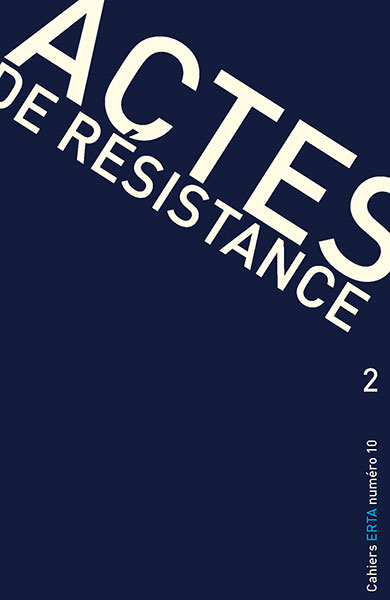Pour une récupération du potentiel démocratique de l'écriture littéraire à l'école
Mots-clés :
literary writing, deinstitutionalization, storytelling, ICTRésumé
This article attempts to discover the current transformations in literary writing teaching and the tendency towards deinstitutionalization of literature in literary education. These phenomena are result from the ability of capitalism to incorporate, to recuperate and turn for its purposes the criticisms addressed to it. That is what happens precisely to the artistic criticism of May ’68, which the project of literary writing at school may be associated with. The study examines the processes of spreading of neoliberal logic in the literary education and some associated with it negative digital practices of writing at school. The article insists on a pharmacological approach to ICT in education and on their really critical, ‘enlightened’ and therapeutic use, as the only one that could contribute to deployment of the democratic, critical and emancipatory potential of literary writing.
Téléchargements
Références
Banaszewski T., Digital Storytelling supporting Digital Literacy in Grades 4‐12, Georgia Institute of technology, 2005, smartech.gatech.edu/ bitstream/handle/1853/6966/banaszewski_thomas_m_200505_mast.pdf.
Boltanski L., Chiapello È., Le nouvel esprit du capitalisme, Paris, Gallimard, 1999.
Boltanski L., Rendre la réalité inacceptable, Paris, Demopolis, 2008.
Bull G., Kajder S., « Digital Storytelling in the language arts classroom », [dans :] Learning & Leading with Technology, 2004, Vol. 32, no 4,http://cs2.cust.educ.ubc.ca/csed/400/csed_readings/display%2024.pdf.
Clément J., « La littérature au risque du numérique », [dans :] Document numérique, 2001, no 1, Vol. 5.
Deleuze G., Critique et clinique, Paris, Les éditions de Minuit, 1993.
Derrida J., « This Strange Institution Called Literature: an Interview with Jacques Derrida », [dans :] Acts of Literature, London, Ed. Derek Attridge, 1992.
Dolz J., Abouzaïd M., « Pluralité des genres et singularité du texte : tensions constitutives de la didactique des langues », [dans :] forumlecture.ch 2015, no 2, http://www.forumlecture.ch/myUploadData/files/2015_2_Dolz_Abouzaid.pdf.
Dufour D.‐R., L'individu qui vient… après le libéralisme, Paris, Denoël, 2011.
Lafont‐Terranova J., Se construire, à l’école, comme sujet‐écrivant : l’apport des ateliers d’écriture, Namur, Presses universitaires de Namur, 2009.
Lafont‐Terranova J., « Travailler conjointement l’investissement de l’écriture et les conceptions de l’écriture du sujet‐écrivant », [dans :] S.‐G. Chartrand et C. Blaser (dir.), Le rapport à l’écrit : un outil pour enseigner de l’école à l’université, Namur, Presses universitaires de Namur, 2008.
Massol J.‐F., « Présentation. Quel avenir pour la didactique de l’écriture littéraire? », [dans :] Recherches & Travaux, 2008, no 73.
Quet F., « Rédiger, s'exprimer, produire : écrire à l’école primaire dans les années 90 », [dans :] Recherches & Travaux, 2008, no 73.
Robin B., « The effective uses of digital storytelling as a teaching and learning tool », [dans :] Handbook of Research on Teaching Literacy through the Communicative and Visual Arts, Lawrence Erlbaum Associates, New York, NY, 2008, Vol. 2.
Salmon Ch., Storytelling la machine à fabriquer des histoires et à formater les esprits, La Découverte, 2007.
Stiegler B., « Sur la culture informationelle. Entretien avec...Bernard Stiegler », [dans :] Médiadoc Fabden, 2009, no 2, www.fadben.asso.fr/ spip.php?article77.
Zizek S., « The Interpassive Subject », [dans :] The Symptom, 2002, no 3, http://www.egs.edu/faculty/zizek/zizek‐the‐interpassive‐subject.html.
Sujet lecteur, sujet scripteur : Quels enjeux pour la didactique ?, [dans :] Le Français aujourd'hui, 2007, no,157.
L'Atelier d'écriture, http://perso.wanadoo.fr/jean.hamez/ecriture.html.
StoryWrite, http://www.lectramini.com.
Écrire en lisant des récits de vie, http://lettres.ac‐creteil.fr/cms/ spip.php?article303.
Stratégie pour la mise en œuvre efficace des technologies de l'information et de la communication dans éducation et les sciences en République de Bulgarie 2014‐2020, strategia_efektivno_ikt_2014_2020.pdf

 Revues scientifiques académiques
Revues scientifiques académiques





